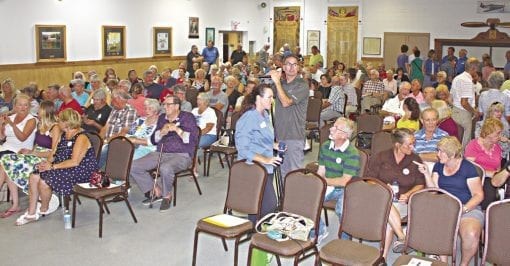Debate draws capacity crowd
BY JENNIFER CHORNLEY Special to the VOICE
It was a packed house as 200 Pelham residents filled the Fonthill Royal Canadian Legion Branch 613 auditorium for the 2018 Pelham Mayoral Debate last Tuesday evening.
Organized by the Fonthill Rotary Club and Welland-Pelham Chamber of Commerce, electors took the opportunity to engage and share their concerns with candidates running for positions with the Town, Niagara Region, District School Board of Niagara and Niagara Catholic District School Board.
 Following a meet-and-greet came the main event. The mayoral debate featured current Town Councillor Gary Accursi, former business owner Carla Baxter, and former Town Councillor Marvin Junkin. Dr. David Siegel, a Political Science professor at Brock University, was the event moderator.
Following a meet-and-greet came the main event. The mayoral debate featured current Town Councillor Gary Accursi, former business owner Carla Baxter, and former Town Councillor Marvin Junkin. Dr. David Siegel, a Political Science professor at Brock University, was the event moderator.
The candidates expressed their views and outlined their plans on a variety of issues. Candidates also had an opportunity to explain the main deciding factor to run for the Town’s top post.
One of the main questions addressed was what’s the most important issue facing the municipality and how would it be addressed.
For Baxter it was the Town’s finances.
“Taxpayers feel that the Town's spending is out of control. There has been not enough transparency in regards to expenses as well as the transactions relating to the development of the arena and the sale of land. I feel our council lost sight of what was originally a worthwhile project. In building a new community center the original idea was to consolidate Town services. However, the new beautiful complex comes with a hefty price, one that a community of approximately 18,000 residents could hardly afford. As one resident pointed out— big-city ideas with small town budget.”
If elected, Baxter said she would include the operating costs of the centre in the budget.
“We will need to be vigilant in ensuring that these expenses are as low as possible, and we need to encourage revenue-generating events to help offset these costs. Furthermore, we need to ensure that the revenue exceeds the expenses for providing those events.”
Baxter also pointed out that Town administrative staff costs have increased 25 percent since 2013, jumping from $6 million to $8 million. The library also faced increased salary and benefit costs of six percent from 2016 to 2017, while operating on a budget deficit of $78,000. Of the $950,000 library budget, just over $750,000 consisted of staffing costs.
 She suggested that the newly elected council could conduct a review to ensure there is a need for all jobs within the administration.
She suggested that the newly elected council could conduct a review to ensure there is a need for all jobs within the administration.
Marvin Junkin also addressed the issue of the Town’s finances and said that if elected he would completely open the books to get a better grasp of the Town’s debt situation.
“It is only after we have this knowledge will we be able to formulate a plan to rebuild reserves and repair many aspects of the Town's infrastructure that over the last three years have been allowed to fall into a pitiful state of neglect,” Junkin said.
“Public trust is the main thing that has to be restored in this town. Finances are important and we need to know exactly where we stand and what sort of risk is involved with the current plan to get us back in the black.”
He added that the next council’s hands will be tied to an extent over the next few years.
“In a small town like Pelham, the government needs to be a what-you-see-is-what-you-get concept,” Junkin said.
“I will rebuild public trust by taking small steps such as engaging the residents in meaningful, full discussions, much like Town Hall meetings but with no mediators allowed.”
Balancing preservation of small town charm with growth and development is the biggest issue from Gary Accursi’s point of view.
“Growth and development is necessary. It revitalizes a community,” he said. “It brings in new families, businesses, ideas and, yes of course, new tax money. Communities that do not grow will inevitably disappear.”
Accursi cited a list of examples that have lead to the town’s “unprecedented growth” over the past years, adding that no growth or new development is without its challenges.
“I believe that formal Town Hall meetings will go a long way to increase a feeling of engagement and inclusiveness,” Accursi said.
“I envision that some of these meetings will be informational, so our council and staff work with you, the citizens of Pelham.”
Regarding marijuana production facilities, Baxter would like to establish an interim bylaw deferring approval of any more facilities until another municipality receives environmental and health impact results. Baxter would also opt Pelham out of being a community that retails marijuana products.

With Junkin, the issue came to the forefront during his time on council.
“I believe that as a council we were not prepared for this industry coming to this area in the droves that it had. It took everyone by surprise on how big it was,” he said.
Junkin said once facilities kept coming that’s when the Town should have began exploring and questioning how other Niagara municipalities were monitoring the expanding industry.
Initially, Health Canada was no help from Junkin’s view.
“I believe we put way too much faith in Health Canada regulations and guidelines.”
When the complaints started coming because of the distinctively skunky odours produced by the facilities, residents were told to contact Health Canada, but the agency batted the complaints back, asserting that they were the municipality’s responsibility.
Accursi said that with the marijuana production facilities being designated as agricultural, the provincial and federal governments did provide local municipalities with the proper tools to manage how they would be included in the community.
One problem he cited was that the federal government didn't create enough management officers to go out and enforce their own legislation.
“It was dumped on the local municipality’s bylaw officers.”
Each candidate had their reasons for putting their name in the hat.
“I truly believe that I have the experience and vision for the next four years,” Accursi said.
He feels that his business and council experience will allow him to manage the Town’s assets in a businesslike manner, while preserving its small-town feel.
For Baxter, inspiration to run came during her initiative to save the Timmsdale House.
“Listening to the people and hearing their frustrations of what they felt was going on made me think about what I wanted for my and my grandchildren's future.”
The historical building that was situated on Highway 20 West was demolished in August 2017.
“I believe that the citizens of Pelham feel they have been left out of major decisions, and haven't been given true facts on many of these projects,” Junkin said.
“I just don't think the Town was doing a very good job of communicating, and I don't think that the residents were being listened to in some of the decisions.”


